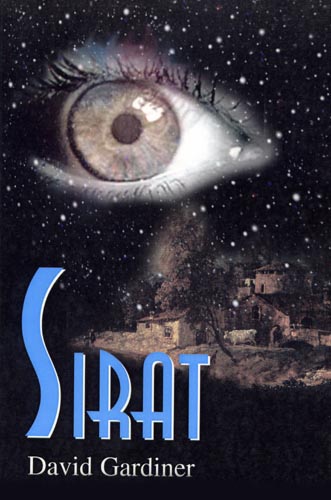|
David Gardiner's latest novel is a facinating blend of the autobiographical and the counterfactual. Yes, he did run a pirate radio station in Belfast, during the heady days of the Northern Ireland civil rights movement. However, unlike Danny – his ingenue protagonist – Gardiner denies designing and assembling pipe bombs for the IRA. The only child of a brilliant doctor – who is also a veteran of the Spanish civil war – Danny has been raised to reject priestly mumbo-jumboa and to embrace the achievements of scientists, revolutionaries, and the whole secular pantheon.
We first meet schoolboy Danny, aged 14, anticipating a caning for supplying, to his schoolmates, badges commemorating the exploits of Soviet cosmonaut: Yuri Gagarin. Danny has obtained the contraband by writing fan letters to Radio Moscow. Despite not having the exceptional intellectual gifts of his father, Danny has a strong aptitude for all things connected with radio. He builds radio sets and oscilloscopes. Taking inspiration from the sea-borne Radio Caroline, Danny aspires to pirate broadcast a music show across Belfast and its environs. That innocent(though illicit) ambition brings him into contact with, first:
Big Jim Harrison, IRA Commander of Belfast – an old school Sinn Feiner, who had fought beside Danny's daddy in the International Brigade. Big Jim takes a shine to the son of his old comrade – even though Danny's father has scant political sympathy with Sinn Fein. Tragically, the shine Big Jim takes illuminates Danny's radio engineering skills; and, without realising it at the time, Danny is coopted into the IRA, and goes on to become something of a star player, at a time of high historical significance for Northern Ireland.
The second fruit of Danny's pirate radio ambitions is the deliciously tempting Joyce, who forbids her love to no man she fancies. Alongside, what some might view as, her moral failings – Joyce is gifted with exceptional musical talent and a voice rivalled in beauty only by her dazzling physical attributes. A happy recipient of Joyce's sexual bounty, Danny is dismayed to realise that she is a lark who alights where she wills, and although Joyce will allow him to caress her, she will not allow him to hold her forever.
As the rosy haze of renewed Irish Nationalism curdles into a bloody nightmare of bombing and sectarian killing, Danny follows Joyce to Wales. There, Danny – who is still on a stipend from the IRA – encounters other, more benign and personally convivial currents of the 1960s youth movement. The buds of Joyce's musical career are bursting open. With her band, The Diggers, she has a major success at the Cambridge Folk Festival. Joyce continues to sleep with Danny, but bestows her favours on the other males around her. The Diggers have taken their name from the 17th Century collective, lead by Gerald Winstanley. Like the "ugly duckling" who only realises that he is a "swan" when he meets others of his kind, Danny comes to realise that Winstanley's utopian vision has far greater appeal to him than the mirage of a free Ireland. He shifts his engineering skills – from the hellish products, desired by his IRA paymasters – to the building of Winstanley's vision, on a hill farm in Wales. There proves to be a serpent in this paradise, however; and, although Danny might hope that he has shed the skin of his Belfast self, the coils of the emergent, vicious, Provisional IRA, wind tightly around him. How all this resolves makes for a cracking read!
Jim Buck
Amazon UK review
Growing up among the turmoil of Northern Ireland in the 1960s was a challenge for the entire country, but for Danny Gallagher, a teenage boy attending a Roman Catholic school in Belfast, the constant unrest drove an undercurrent of excitement and danger that was too alluring to resist.
A whiz at anything having to do with electronics and amateur radios, Danny soon caught the interest of the local branch of the IRA and was soon recruited to do a few small jobs for the group. This secretive involvement would soon lead to changes in Danny’s life that would affect the rest of his life, and alter the history of the Northern Irish for the rest of time.
The fast-paced, action filled novel, “Engineering Paradise,” by David Gardiner, not only documents a restless time in Irish political history, it also shows how those changes in society affected the average person as well. Part love story, part coming-of-age drama, and part military history, Gardiner’s masterful storytelling skills are evident in this heart-wrenching tale that is set against a backdrop of actual events. Gardiner draws his readers into the heart of the story with prose that is lyrical and captivating. You’ll find yourself rooting for Danny Gallagher to achieve all he dreams of.
I highly recommend this novel.
Sharon Galligar Chance
Scripps Howard News Service: Wichita Falls Times, Las Vegas Review Journal and Ventura County Star
Set against events recorded in grainy black and white documentary footage, or in the memoirs of retired journalists and aging IRA hard men, the novel conjures to life first-hand an increasingly distant era, a disturbing time. Like the Indian Mutiny or the Boer War, the Irish Troubles are a blight the British establishment would love to forget, or somehow manipulate and neatly credit to their cause. Hence the immense value of this work, its detail, and characters, its astonishing technical accuracy. And David Gardiner’s novel is a real page-turner.
The background Ireland, so near to the UK, yet always so far, so constantly misunderstood, lampooned, neglected, abused, censored as a subject of media coverage and conversation on the mainland. Mention anything to do with Ireland, the IRA, Irish people, logical analysis shuts down, hysteria, absurdity, and prejudice erupt. Over the last 700 years, ongoing to the present day, Ireland has been the English journey up the river into the heart of darkness. The universal value of Engineering Paradise thus stems from its lack of political dogma and propaganda, its essential strength the neutral portrayal of civil war. The historical context is 1960s Britain, but with a little imagination it could be the 1690s, it could be any epoch, any locale.
The protagonist of the novel meanders his way Candide-like through this labyrinth of circumstances, ostensibly within his bounds, but increasingly Faustian. With the use of excellent dialogue, David Gardiner develops the characters as independent persona against this tableau, also as emblems reflecting a murky epoch in British history, and the never-ending human quest for a utopia.
Ultimately, with a neat twist in the tale, the novel makes us calculate, consider very carefully. What is it about humans that makes holocaust so easy to engineer? Surely we can answer, look into the mirror and reflect, travel up river into our heart of darkness with the same degree of intelligence and analysis? If so, a remote possibility exists for engineering paradise.
Andrew McIntyre
Author of The Short, the Long and the Tall, Gold Dust magazine Issue 20, winter 2011
David Gardiner is no newcomer to telling tall and short tales. His The Other End of the Rainbow (2008), and The Rainbow Man and other Stories (2010), are a testament to the power and delight embedded in his imaginative short story telling. Sirat (2000), revealed his strengths in writing science fiction novels. Engineering Paradise is quite different in that is a semi-autobiographical story with free love, commune-living, and Irish life for a lad coming of age and being drawn in to the Troubles along with his friends. The title is derived from a Stafford Beer quotation: ‘The Holocaust has shown us that the creation of hell on earth is just a matter of engineering. The creation of an earthly paradise is an engineering problem also.’ (1926-2002), This hints at the philosophical feel of the novel, but it reflects too the innate nature of Danny, the protagonist, with his engineering aptitude for making radios and solving the problems of bomb making yet with an urge to find happiness and love.
Although much of the content is political and philosophical, including references to 17th Century Gerrald Winstanley and the The Diggers, the style has ironic humour that makes the novel a page-turner. Much of the humour digs at authority and the establishment, while amusement is also derived by irreverent jibes at the Church. For example, in response to people suffering illnesses and untimely deaths, Danny’s father (a GP) says: “If there really is a God up there, I don’t know how he sleeps at night.” These light yet poignant moments are balanced by thoughtful episodes in which Danny’s adolescent mind ponders “...everyone’s mortality, including his own.”
Danny, through his mechanical propensity, eagerness to please and naivety with regard to the wiliness of 1960s IRA recruitment methods, is sucked into the movement. He’s no academic and yet is good with words and hands, and not backwards in coming forwards with sweethearts. Churchill’s famous quote about Clement Atlee is used to describe him admirably: ‘modest, but then he has so much to be modest about.’
Luckily, Danny falls in love with a local beauty. Unluckily, she enjoys other lads too. With such turbulence in his emotions and learning on the go how to cope with so many non-normal behaviour for those times, it is no wonder that ‘His mind flailed around furiously...’.
The story travels from Belfast to the Isle of Man, North Wales to England, beautifully described and expertly crafted. Learn history, philosophy, bomb and love making, radio transmission, and Life. This is a masterstroke book, a masterpiece.
Geoff Nelder, Science fiction author and editor
|













